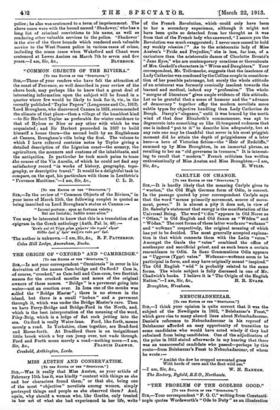MISS AUSTEN AND CONSERVATISM.
[To THE EDITOR OF THE " SPECTATOR." ) SIR, Was it really that Miss Austen, as your article of February 15th has it, was kindly "content with things as she and her characters found them," or that she, being one of the most "objective" novelists among women, simply portrayed things and people as she observed them ? And, again, why should a woman who, like Goethe, only treated in her art of what she had experienced in her life, write of the French Revolution, which, could only have been to her a secondary experience, although it might not have been quite so detached from her thought as it was from that of the French lady who answered," I assure you the. Revolution was much exaggerated; I never once ceased to hold my weekly reunion !" As to the aristocratic lady of Miss Austen's " Pride and Prejudice," she is less, far less, of a caricature than the aristocratic dames of Charlotte Bronte's " Jane Eyre," who are contemporary creations or thereabouts of Mrs. Gaskell's characters in" Wives and Daughters." Your correspondent, Mr. Tollemache, suggests that the insolence of. Lady Catherine was condoned by the Collins couple in considera- tion of her possible patronage, but surely the whole attitude- of an aristocrat was formerly comically insolent towards the learned and medical, indeed any "profession." The whole. " morgue of literature " gives ample evidence of this attitude. Let us be grateful that a sense of humour and the "advance of democracy " together offer the modern novelists more subtle types for objective handling than Lady Catherine de Burgh. Darcy's" eiegance," until it was braced by the north wind of that dear Elizabeth's commonsense, was apt to degenerate into something so like ill-tempered rudeness that one is indeed " put to it" to describe him adequately, but at any rate one may be thankful that never in his most priggish moment did he attain the depth of priggishness of a later hero—a hero of Victorian fiction—the "Heir of Redcliffe," summed up by Miss Broughton, in an immortal phrase, as recalling to her an " old governess in trousers." It is interest- ing to recall that " modern" French criticism has written enthusiastically of Miss Austen and Miss Broughton.—I am,














































 Previous page
Previous page